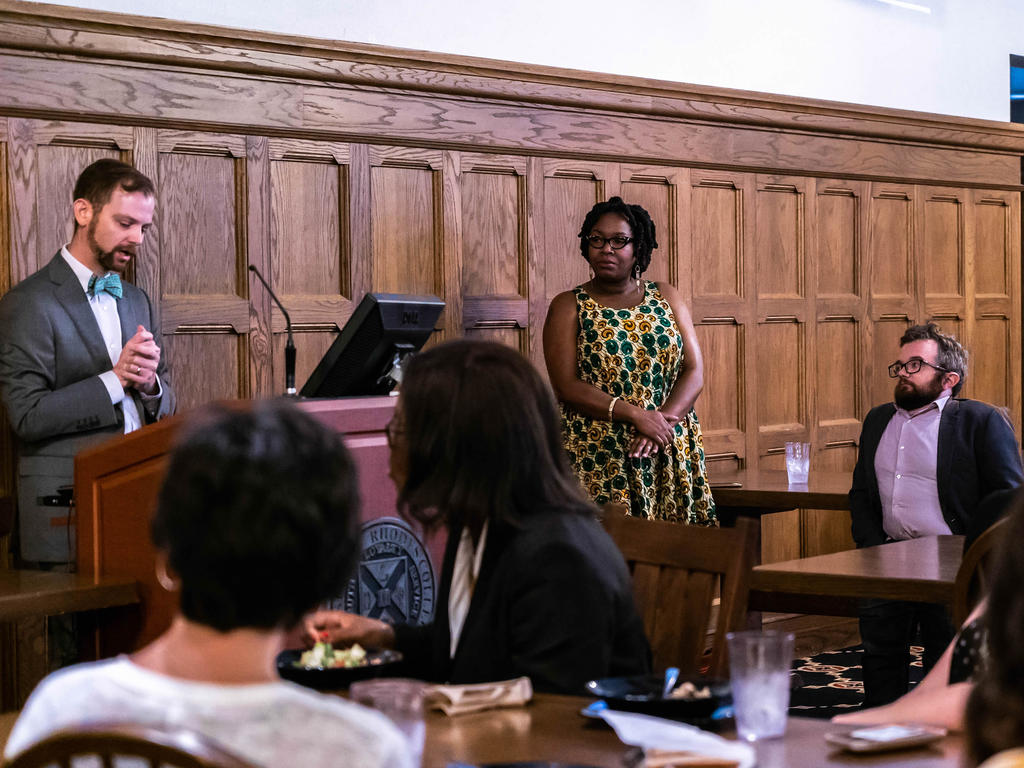On Aug. 29, a mix of faculty, staff, and students gathered in Rhodes’ Hyde Hall as the strains of “I Knew You Were Waiting (For Me)” and “Son of a Preacher Man” played in the background. They came for lunch and an intimate discussion about the life, music, and Memphis roots of Aretha Franklin, who died Aug. 16.
“We are all here because of our love for the Queen of Soul,” said local performer and music educator Tonya Dyson. She and Rhodes professors Dr. Charles Hughes and Dr. John Bass spoke at the event sponsored by Rhodes’ Lynne and Henry Turley Memphis Center and Mike Curb Institute for Music.
Bass spoke about Memphis being Franklin’s birthplace and of her connections with the city, including recording a song by Memphis-born jazz musician Lil Hardin Armstrong. Bass played excerpts from famous songs performed by Franklin, while the audience bobbed their heads and mouthed the words to their favorites.
Dyson noted that although Franklin was known for gospel and R& B, she also sang jazz and opera. “One of my favorite songs is a jazz standard,” said Dyson, referring to Aretha Franklin’s version of “Skylark.” Dyson also talked about Franklin stepping in at an awards show for opera singer Luciano Pavarotti, who had fallen ill, and singing “Nessun Dorma.”
Franklin received many honors over her lifetime, including winning 18 Grammys, becoming the first woman to be inducted into the Rock & Roll Hall of Fame, and receiving the Presidential Medal Of Freedom. Hughes recounted that Franklin’s songs were also adopted by the civil rights and feminist movements. “One of the things about Aretha Franklin’s music is that her music hit people very, very deeply, particularly among certain communities.” He gave as an example “Chain of Fools,” and said, “It even was picked up by soldiers in the Vietnam War at the point they were beginning to become increasingly aware of the chain of command that was leading them into a war.”
One of Franklin’s signature songs, “Respect,” was originally released by Otis Redding, but Franklin covered it with added riffs and R-E-S-P-E-C-T spelled out. “She transformed that song as a brand new song, as far as demanding what is due,” said Dyson.
Other song excerpts played at the Rhodes event included “Until You Come Back to Me,” written for Franklin by a young Stevie Wonder, and “A Rose is Still a Rose,” written by singer, rapper, and songwriter Lauryn Hill. The presenters noted that Franklin was known to champion young musicians. Off stage, she also supported many charities and causes.
“She had genuine appreciation for other songwriters, and they were flattered that she even listened to their songs, let alone cover them,” said Dyson about Franklin. “We all know that she takes songs to a new level of expression . . . A lot of people just know her for singing and for musicianship, but the things she did off stage is what made her a queen.”
